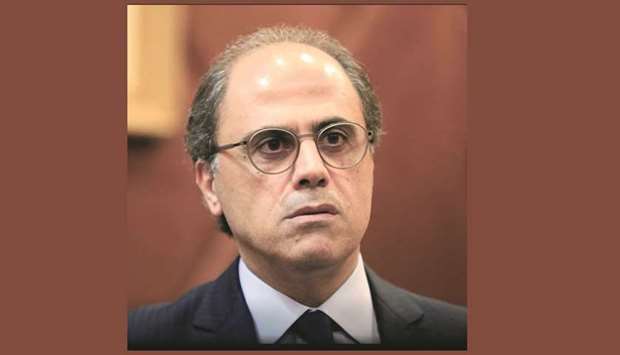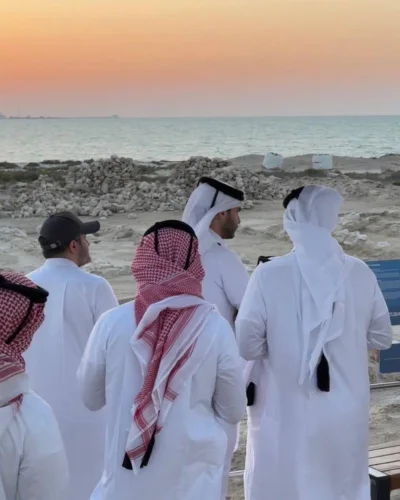International Monetary Fund (IMF) expects that the FIFA World Cup Qatar 2022 will lead to improvements gradually to the country’s economy.
“We expect Qatar economy to recover next year with positive growth,” said Jihad Azour, director, Middle East and Central Asia Department, at IMF.
At a recent online media event to present the regional economic outlook, Azour said, “The situation in Qatar to a great extent is similar to what we see in other countries. Qatar has done directly, has worked directly in order to face the pandemic with a number of protective measures and health measures as well. In addition, it has taken certain measures to support the situation of the citizens and to safeguard a number of programmes that would contribute mitigating the repercussions of this pandemic on the economy of Qatar.”
Azour noted the “decline of oil prices and gas” has had its impact on the economy, especially the investments made by Qatar currently in order to prepare for the World Cup 2022.
“So, overall, it is expected that the economy of Qatar will decline in terms of growth, which will be positive 4% to 5% this year and it will be expected to recover next year with positive growth.”
He said countries in the region responded swiftly and resolutely when Covid-19 hit. And many of the emergency measures from those, boosting health sectors to policies aimed at assisting households and businesses, help countries cope with the crisis's immediate impact.
However, given the uncertainty surrounding the pandemic's trajectory and the scale of the challenges it has created, countries in the region continue to face a difficult economic environment.
For oil exporters in the Middle East, North Africa, Afghanistan, and Pakistan region, growth is now projected at minus 6.6% in 2020 – reflecting the combined impact of the decline in oil prices and production cuts, and the lockdowns.
Oil-importing countries that benefit from lower oil prices are being mostly offset by hampered trade, tourism, and remittance – with growth in 2020 projected at minus 1%. And for the Caucasus and Central Asia, a contraction of 2.1% is expected for 2020, driven by the region's oil importers.
Azour said the pandemic may “inflict deeper and more persistent economic scarring” than previous recessions in the region given severe vulnerabilities entering the crisis and its unprecedented nature. In fact, it is estimated that the output in the region would return to trend, only after a decade.
Additionally, fiscal revenues in the region have declined sharply due to the lockdowns and the oil shock. This is occurring of course at the same time that the variety of fiscal measures has been employed to save lives and livelihoods.
For instance, he noted oil exporters are expected to experience a $224bn revenue shortfall this year.
Some countries, he said, will “incur their highest deficit” in 20 years. In turn, higher deficit will raise their burdens, eroding fiscal space in some countries.
The crisis has heightened corporate default risk and credit risk for banks in the region with potential losses that could amount to $190,000bn, or 5% of GDP.
“If unaddressed, these developments may threaten financial stability and efforts for great financial inclusion,” Azour noted.
“IMF commitments to the region are never stronger than in times of great challenge. So far this year, the fund has provided nearly $17bn in financing to 14 countries in the region increasing IMF's credit outstanding by nearly 50 percent relative to 2019. We will continue working with the authorities to provide policy advice, technical assistance, and financial support when needed.
“While we undoubtedly face many more difficult days, the goal of building inclusive, prosperous, and resilient economies through the regions remain within reach in the coming years. And we look forward to working together with countries in the region to achieve this goal,” Azour added.
At a recent online media event to present the regional economic outlook, Azour said, “The situation in Qatar to a great extent is similar to what we see in other countries. Qatar has done directly, has worked directly in order to face the pandemic with a number of protective measures and health measures as well. In addition, it has taken certain measures to support the situation of the citizens and to safeguard a number of programmes that would contribute mitigating the repercussions of this pandemic on the economy of Qatar.”
Azour noted the “decline of oil prices and gas” has had its impact on the economy, especially the investments made by Qatar currently in order to prepare for the World Cup 2022.
“So, overall, it is expected that the economy of Qatar will decline in terms of growth, which will be positive 4% to 5% this year and it will be expected to recover next year with positive growth.”
He said countries in the region responded swiftly and resolutely when Covid-19 hit. And many of the emergency measures from those, boosting health sectors to policies aimed at assisting households and businesses, help countries cope with the crisis's immediate impact.
However, given the uncertainty surrounding the pandemic's trajectory and the scale of the challenges it has created, countries in the region continue to face a difficult economic environment.
For oil exporters in the Middle East, North Africa, Afghanistan, and Pakistan region, growth is now projected at minus 6.6% in 2020 – reflecting the combined impact of the decline in oil prices and production cuts, and the lockdowns.
Oil-importing countries that benefit from lower oil prices are being mostly offset by hampered trade, tourism, and remittance – with growth in 2020 projected at minus 1%. And for the Caucasus and Central Asia, a contraction of 2.1% is expected for 2020, driven by the region's oil importers.
Azour said the pandemic may “inflict deeper and more persistent economic scarring” than previous recessions in the region given severe vulnerabilities entering the crisis and its unprecedented nature. In fact, it is estimated that the output in the region would return to trend, only after a decade.
Additionally, fiscal revenues in the region have declined sharply due to the lockdowns and the oil shock. This is occurring of course at the same time that the variety of fiscal measures has been employed to save lives and livelihoods.
For instance, he noted oil exporters are expected to experience a $224bn revenue shortfall this year.
Some countries, he said, will “incur their highest deficit” in 20 years. In turn, higher deficit will raise their burdens, eroding fiscal space in some countries.
The crisis has heightened corporate default risk and credit risk for banks in the region with potential losses that could amount to $190,000bn, or 5% of GDP.
“If unaddressed, these developments may threaten financial stability and efforts for great financial inclusion,” Azour noted.
“IMF commitments to the region are never stronger than in times of great challenge. So far this year, the fund has provided nearly $17bn in financing to 14 countries in the region increasing IMF's credit outstanding by nearly 50 percent relative to 2019. We will continue working with the authorities to provide policy advice, technical assistance, and financial support when needed.
“While we undoubtedly face many more difficult days, the goal of building inclusive, prosperous, and resilient economies through the regions remain within reach in the coming years. And we look forward to working together with countries in the region to achieve this goal,” Azour added.




